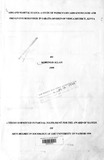| dc.description.abstract | This study focused on married women in Sabatia division ofVihiga District. It had the main goal of investigating their levels of awareness and knowledge of AIDS as well as examining their HIVI AIDS preventive behaviour. This was in view of understanding their role and capability in influencing marital sexual behavior related to HIV I AIDS prevention.
The main objectives of the study included; investigating knowledge among married women concerning, HIV transmission and prevention; examining their attitudes concerning personal vulnerability and the preventive strategies they have adopted; exploring their capacity to influence marital sexual behavior related to AIDS prevention as well as the male perspectives on women's role in sexual decision making and AIDS prevention; and identifying factors that promote or hinder married women's ability to influence marital sexual behavior in HIV/AIDS pevention.
This study employed a combination of both quantitative and qualitative techniques. Qualitative techniques used included Focus Group Discussion, informal interviews, key informants and observation. Quantitative techniques included use of questionnaires and interview schedules which included both written and unwritten questions. Data processing and analysis were quantitatively and qualitatively applied.
The study found that despite the inaccurate and distorted views about AIDS most married women in Sabatia were aware of the heterosexual transmission of AIDS. They were also acutely aware ofthe seriousness and consequences of AIDS infection although majority ofthem tended to deny their own vulnerability. Most of the strategies that women reported to have adopted to protect themselves from HIV infection were those which they felt would not challenge their husband's sexual superiority and freedom. Although men generally felt that there was need for women to protect themselves from HIV/AIDS infection there was skepticism among them on the role of women in sexual decision making in this regard. It was noted that a majority ofthe married women had either no or low ability to influence marital sexual behaviour related to AIDS prevention.
The major factors that promote married women's ability to influence adoption of HIV/ AIDS preventive behaviour were found to be their awareness as well as knowledge of AIDS and their realisation of the need to change some long established beliefs about marital sexuality that give husbands superior status to their wives. The main barriers included the negative attitudes towards condom use in marriage; women's surbodinate economic status; and finally the long established beliefs about sexual rights and the culturally rooted expectations of marital sexual behaviour which promote male sexual superiority over women.
This study therefore recommends that HIV / AIDS surveillance, education and condom distribution programs must continue with even greater support and determination. However, a fourth component, namely, normative change, must simultaneously be addressed. This approach would infuse current AIDS prevention activities with empowerment - oriented strategies which place AIDS
in the context of women's sexuality and social status. The blue print [or action must therefore now include not only informing, educating and motivating, but also enabling. | en |

